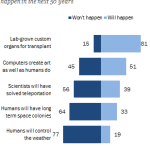Après l’Icann, les Etats partisans d’une autre gouvernance envisagent de s’intéresser à l’IETF (Internet Engineering Task Force), l’organisme qui fixe les normes permettant à Internet de se moderniser tout en restant un réseau unifié. Or, l’IETF, pur produit de la culture Internet, est une réunion informelle d’ingénieurs travaillant bénévolement. […] La philosophie de ses membres tient en une devise, édictée en 1992 par l’informaticien américain David Clark, l’un des fondateurs de l’Internet : « Nous rejetons : les rois, les présidents et les élections. Nos croyances : trouver un vague consensus, et faire tourner du code. » La tâche des réformateurs s’annonce compliquée.
Mois : avril 2014 (Page 5 of 11)
C’est ce qui s’appelle une fausse bonne idée. Dans un bel élan communicatif, la police de New York (NYPD) a demandé mardi 22 avril aux New-Yorkais de poster sur Twitter des photos d’eux avec des agents. La suite est vieille comme l’Internet.
Facebook says it’s not using its new Nearby Friends feature to target ads yet, but after I asked why it’s tracking “Location History” it admitted it will eventually use the data for marketing purposes.
Berkeley, Gorman points out, probably has more students than Wikipedia has active editors.
« Initialement basé sur le Peer To Peer, Spotify bascule son système vers une architecture plus traditionnelle de serveurs centralisés » (via Spotify abandonne le P2P et se prépare pour les familles | MacGeneration)
百度筷搜 黑心食品滾蛋 (par 老皓)
No-one is saying that Uber drivers should not pay taxes, follow rules, and protect consumers. But banning Uber does not give them the chance to do the right thing!
It is often said that on the Internet, nothing is too big. Everything eventually crumbles and makes way for new order. But what if one held the keys to the future and the resources to start working on it today. That is Google, and the future belongs to them.



